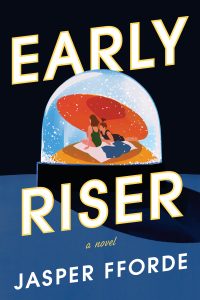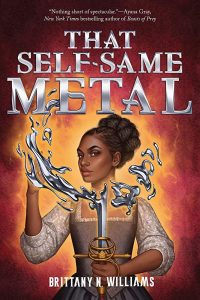Russell Letson reviews Charles Stross
The Nightmare Stacks, Charles Stross (Ace 978-0-425281-192, $27.00, 385pp, hc) June 2016. Cover by Larry Rostant.
 This month’s theme might be horror and the horrific, with the subtheme ‘‘Why am I reading horror when I usually don’t much care for it?’’ Of course, none of the books under consideration here are entirely or even ‘‘really’’ horror, no matter how extensively and elaborately concerned with horrific events, hauntings, or monstrous characters they might be. But this is a matter that has been nagging at me for a long time and it’s an itch I feel the need to scratch.
This month’s theme might be horror and the horrific, with the subtheme ‘‘Why am I reading horror when I usually don’t much care for it?’’ Of course, none of the books under consideration here are entirely or even ‘‘really’’ horror, no matter how extensively and elaborately concerned with horrific events, hauntings, or monstrous characters they might be. But this is a matter that has been nagging at me for a long time and it’s an itch I feel the need to scratch.
What, I keep wondering, lurks behind the horrors that drive these books? What do they deliver beyond mere thrills or sensations? Is there, in fact, ever a ‘‘mere thriller’’ without some underlying anxiety or primal dread – of falling, maiming, powerlessness, entrapment, the dark – the primal fears behind carnival rides and haunted houses? Why devise imaginary, often supernatural horrors when the history books are filled with actual events and practices every bit as bowel-liquefying and nightmare-inducing as anything on the fiction shelves?
And why, for godsake, would I read the made-up stuff? When I was researching late-19th-to-early-20th-century supernatural-scary material in grad school, it became clear that what did not make metaphysical claims (literal or allegorical) was actually confronting psychological issues – that is, some species of symbolically encoded anxiety or fear or pathology. There’s no reason not to apply that to the likes of Charles Stross or Neal Asher. What’s really lurking down in the basements of their stories? What do the Laundry’s eldritch terrors stand for? What do the Prador or run–amok artificial intelligences say about the world we see on the news?
But to business: Charles Stross’s Laundry series belongs to a long line of attempts to rationalize or otherwise repackage and domesticate the supernatural (whether horrific or merely strange-and-fantastical), going back to Algernon Blackwood’s John Silence, William Hope Hodgson’s Carnacki, and other occult detectives (paleo-Ghostbusters), through John Campbell’s Unknown, right up to the current Marvel comics/movies superhero universe(s). The offspring of these cousin marriages in the fantastic-fiction family include all manner of sexy vampires, steampunk zombies, elven cops, secret warlock societies, magical boarding schools, fallen-angel detectives, and every other possible hybrid creature capable of sustaining some intersectional genre identity.
The Nightmare Stacks is a direct sequel to The Rhesus Chart, which added vampires to the Laundry universe’s roster of spooky threats – bureaucratically redesignated (since vampires officially and emphatically Do Not Exist, and because, well, bureaucracy) as individuals suffering from PHANG (Photogolic Hemophagic Atypical Neuroectodermal Gangrene) syndrome. Following the extensive unpleasantness that climaxed The Rhesus Chart, investment-banking-quant-turned-bloodsucker Alex Schwartz has been drafted into the Laundry’s ranks, and before he can complete his training he finds himself at the center of the next supernatural incursion to roll through England’s green & pleasant: an invasion of magic-wielding, imperialist elves from another dimension. Actually, multiple viewpoints contribute to the fiction that the book is Alex’s final report on this episode, compiled by him from various sources: his own Laundry-mandated diary, a close-third-person view from the invading-forces side, and various reconstructions by an omniscient narrator with a voice that often sounds more like Stross’s than Alex’s.
Previous Laundry stories have mixed their horror ingredients with homages to classic intrigue-thriller writers, exemplars, and modes (John le Carré, Anthony Price, superhero comics and movies), and this one eventually takes a turn toward the techno-thriller, all military acronyms and equipment specifications and model numbers, along with the command structures of human and elven armies. But there’s another convention-set operating here. Alex’s life outside the Laundry operates in a very rom-com/Britcom-ish mode, featuring the protagonist-as-nebbish. Alex was isolated, socially awkward, and romantically inexperienced even before his PHANGish condition made everything complicated and impossible to explain to outsiders. (Really impossible, given the blood oaths and geases governing his employment.) When he does finally Meet Cute with an attractive and interested young woman, the object of his romantic ambitions has her own problems, what with her day job as soul-stealing spy from a dimension where dating is as foreign an idea as free will or not murdering rival family members.
This side of the book is crowned by a family Sunday dinner from hell (ordinary domestic secular-materialist variety): Alex with his becostumed and oddly mannered girlfriend-equivalent, his younger sister with her new light-o’-love, Dad well down the gin & tonic rabbit-hole, and Mother too shellshocked by her kids’ dates to properly monitor the roast or defrost the frozen veg. They’re so rattled and disoriented that the pointy-eared fairy-spy/girlfriend who is calling herself ‘‘Cassie’’ can get away with telling the truth about her appearance:
‘‘I’m a princess-assassin of the Unseelie Court!… Not human, not even slightly human. So of course I’m weird and I make horrible social blunders when I try to pass for human! Faux pas is my middle name and I don’t understand human mores at all!… I am sorry for your discombobulation! We’re going to a fancy-dress party later,’’ she confides.
It may or may not help when she adds that ‘‘Alex stole a Nazi half-track motorcycle from a mad scientist he knows through work!’’ Alex (and perhaps the reader) is almost relieved when this rolling social disaster is interrupted by the beginning of the book’s climactic confrontation with Cassie’s terrifying dad and stepmom and their army of death-dealing, blood-drinking sorcerers and fire-breathing air force. (The last detail is not a spoiler – the cover illustration gives it away, along with the role of the Nazi half-track.)
That confrontation is an all-out military campaign, a blitzkrieg attack carried out by a desperate but confident and deadly competent horde that expects to sweep across a magically underdefended land occupied by peasants and unprepared magi. And they’re almost right, which means that while the Laundry scrambles to find the resources and personnel to respond, the invaders cut a swath of eyeball-melting, head-exploding carnage right across the heart of England’s north country, described in enough detail to remind the reader what the armature of this series remains.
Stross’s manic, very verbal, and generally very funny re-encoding of the conventions of supernatural horror feels like an attempt to hold Something at arm’s length – to domesticate, rationalize, encyst, or cushion the raw material of terror and fear; to embed it in a seriocomic adventure in which our viewpoint character and a few others survive the carnage. (Though, to be fair, that viewpoint does not entirely turn away from the nasty fates of named-and-seen characters. Even nameless horrors can be witnessed and detailed.) Stross’s long-unpublished first novel, Scratch Monkey, gives a more direct look at that Something, and I can’t think of a better way of saying what I wrote back then, so I’ll just plagiarize myself: ‘‘It’s a dark, painful story made bearable by the intensity of Stross’s intelligence and the strength of his writing, as though understanding and clear vision and wordcraft could compensate for the pain of seeing what is seen.’’ The comedy and the outcome keep this from being as dire and bleak a book, but it is haunted by some of the same demons.






